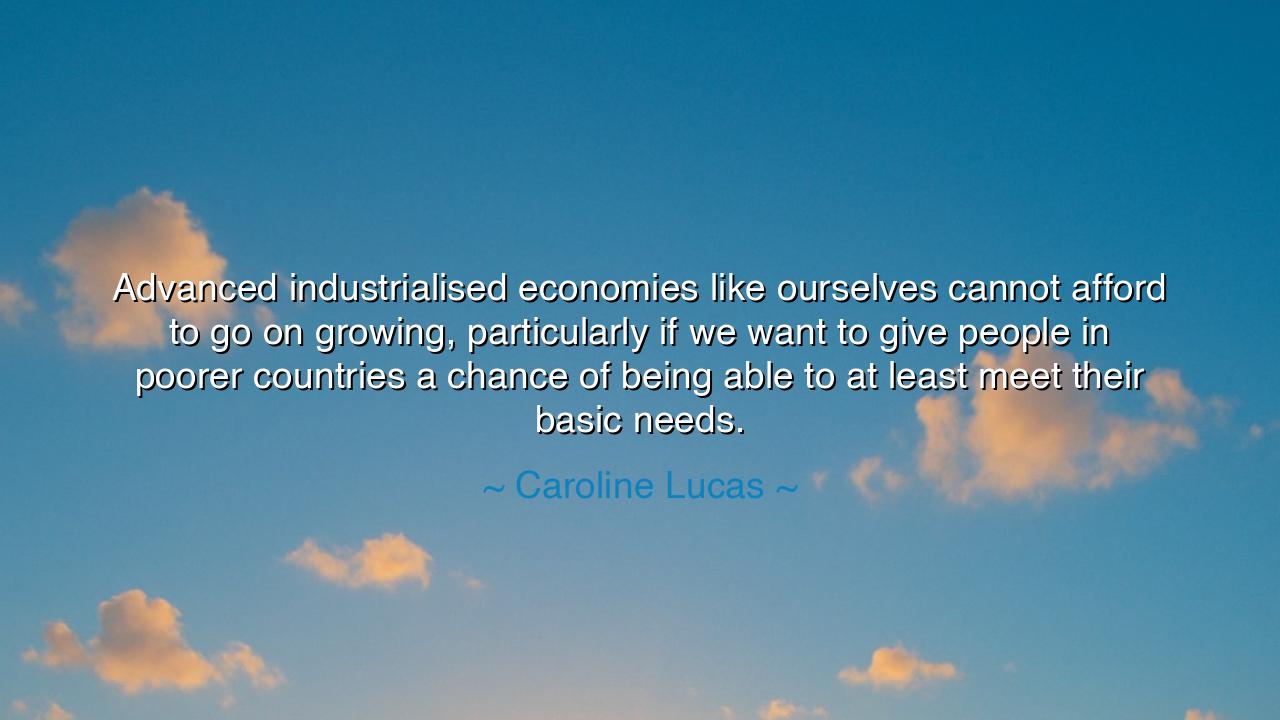
Advanced industrialised economies like ourselves cannot afford to
Advanced industrialised economies like ourselves cannot afford to go on growing, particularly if we want to give people in poorer countries a chance of being able to at least meet their basic needs.






In the vast sweep of human history, there have always been those who sought growth—growth in strength, in riches, in power—believing that expansion could satisfy the deepest longings of humankind. Yet, the wisdom of the ancients warns us that unchecked growth can often lead to destruction, that the pursuit of abundance for some may come at the expense of others. Caroline Lucas, a voice calling from the modern world, speaks a profound truth: "Advanced industrialised economies like ourselves cannot afford to go on growing, particularly if we want to give people in poorer countries a chance of being able to at least meet their basic needs." In these words, we hear the echo of ancient wisdom—a call to balance, to sustainability, and to the realization that growth must serve all, not just the few.
To speak of growth is to speak of a dual-edged sword. The growth of an empire, whether ancient or modern, can bring prosperity, innovation, and progress. Yet, as the Romans knew in their rise to power, unchecked expansion often leads to inequality and the suffering of those who are left behind. The Roman Empire, in its quest to expand, created vast wealth for the elite, but this wealth came at the expense of the common people and the conquered nations. The lessons of history tell us that the greed for endless growth—in resources, in territory, in consumption—can blind us to the needs of others. And thus, Lucas' call is not merely a plea for environmental sustainability, but for a redistribution of opportunity, for a reimagining of what true prosperity means.
The ancients knew that true greatness came not from the exploitation of others, but from balance and equity. Confucius, the great philosopher of ancient China, spoke often of the balance between the individual and the collective. He warned that a society out of balance—where the wealthy thrive at the expense of the poor—was a society that would eventually fall into disorder. His teachings were not just about personal virtue but about creating a harmonious society, one where the prosperity of the few did not overshadow the needs of the many. Caroline Lucas' words echo this wisdom, reminding us that the growth of advanced economies cannot be allowed to leave the rest of the world behind. The needs of the poorest must be recognized and met, for only in balance will humanity thrive.
In the story of the American Revolution, we see another example of how unchecked growth and the concentration of wealth in the hands of a few can lead to rebellion and a desire for justice. The American colonists, though wealthy by the standards of the time, were increasingly aware of the disparity between their opulence and the poverty of the enslaved populations and the indigenous peoples. The very growth of the colonies—built on exploitation—was seen as an affront to the ideals of equality and justice. In seeking their own independence, they sought not just freedom from tyranny, but the right to create a society where all could have the chance to thrive. Lucas' words remind us that the growth of modern economies, too, must be measured not by how much can be taken from the world, but by how much can be given to those who have the least.
What Caroline Lucas urges us to realize is the essential truth that no society can thrive in the long term if its growth comes at the cost of others’ well-being. True progress is not measured by the abundance of material goods or the growth of profits, but by the satisfaction of the basic needs of every individual. And yet, the modern world often places economic growth above all else—pushing for more production, more consumption, and more wealth, without considering the cost to the planet or to the human soul. The ancients taught us that the path to greatness lies not in endless expansion but in the wisdom to live in harmony with the world and with each other.
The lesson that Lucas imparts is clear: we must learn to define prosperity not by the quantity of goods or the power of economies, but by the quality of life we create for all people, especially those who have been left behind. We must ask ourselves, as societies and as individuals: What good is the growth of one if it comes at the expense of another? What good is prosperity if it leaves the most vulnerable to suffer in silence? The wisdom of the ancients, from Confucius to the Roman philosophers, reminds us that true strength lies in balance, in sharing, and in justice for all.
So, my brothers and sisters, let us reflect on Caroline Lucas’ call to balance. Let us not be blinded by the lure of endless growth, but strive instead for a world where prosperity is shared, where the basic needs of every human being are met, and where our success is measured not by our consumption, but by the well-being of all people. May we seek a future where the richness of the Earth is not plundered for the gain of the few, but nurtured for the benefit of the many. In this, we will find true greatness, the kind that echoes through the generations and sustains the world for all who come after us.






AAdministratorAdministrator
Welcome, honored guests. Please leave a comment, we will respond soon